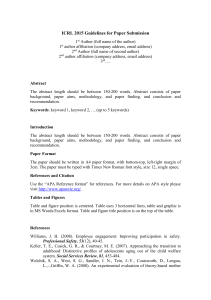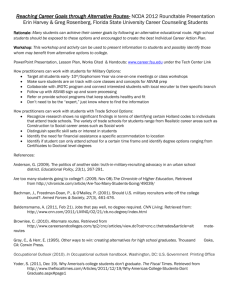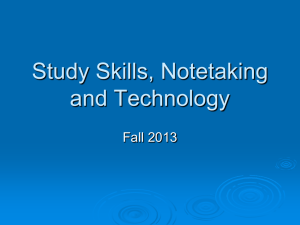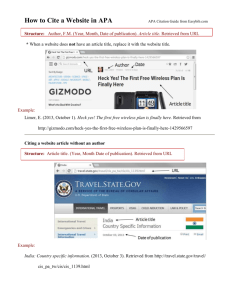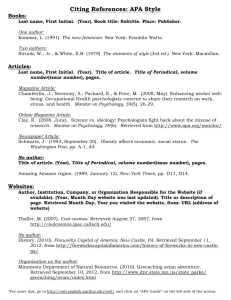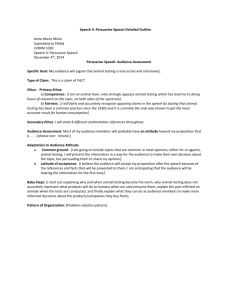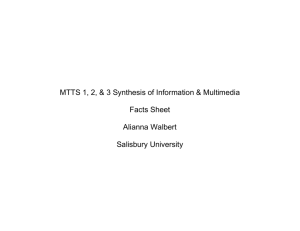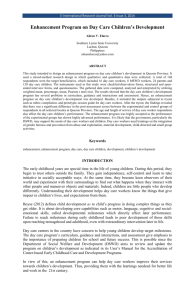Stress Management - Ridgewater College
advertisement
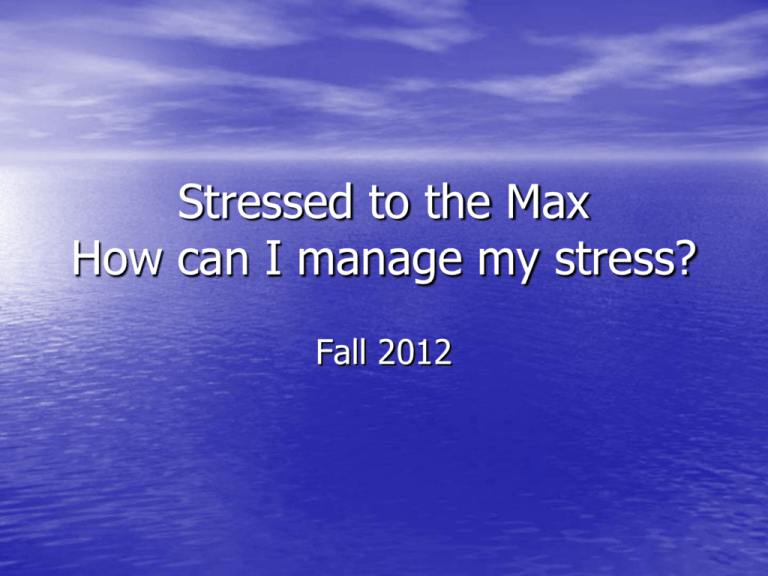
Stressed to the Max How can I manage my stress? Fall 2012 What is stress? • Stress is part of everyday living • It is not necessarily events that cause stress, but how we react to the events • Symptoms can include mental, social and physical issues-exhaustion, changes in appetite, headaches, crying, changes in sleep patterns, using drugs or alcohol Is stress always bad? • Stress can be positive or negative – Positive stress: • Motivates us • Is short term • Is exciting • Improves our performance – Negative Stress • Does not go away-it builds • Can lead to problems such as lack of concentration, headaches, anxiety, fatigue Factors that affect stress • Individual perception of stress – How we look at things, can affect our response to stress – Are you optimistic? • Your support network – Who do you have to support you? Things that build stress • Perfectionism – Are you a high achiever – Do you criticize yourself when your work is not perfect – Do you always feel you could have tried harder • Control – Do you have to be in control at all times – Do you feel lack of control is sign of failure – Do you have difficulty delegating to others • People Pleasing – Do your feelings about yourself depend on other’s opinion about you – Do you avoid things because you are concerned about disappointing others – Do you take better care of others than you do of yourself • Confidence – Do you feel you will never be as good as others – Do you feel you lack common sense – Do you struggle to believe people that tell you have done a good job Common symptoms of stress • Feelings – Anxious, fear, irritable, angry • Thoughts – Low self-esteem – Fear of failure – Worrying about the future – Preoccupation Symptoms cont • Behavior – Crying – Acting impulsively – High pitch laughing or nervous tone of voice – Increasing drug or alcohol use • Physiology – Sweaty hands – Increased heart rate – Trembling – Tiring easily – Butterflies in the stomach – Changes in eating patterns What is stress management • It is the ability to maintain control when situations (people, events, etc) cause us to feel stress symptoms Things college students do to add stress: • Stay up all night to study • Loading up on caffeine • Having “study parties” with your friends • Waiting until the last minute-cramming • Worrying about what is at stake • Trying to work and go to school..Full Time What things can I do to manage stress? • • • • • • • • Change the situation if you can Remove yourself from the situation Don’t sweat the small stuff Change the way you react to it-start small Avoid extreme reactions Get enough sleep Learn how you relax best Set realistic goals • Don’t overwhelm yourself • Change the way you see things • Do something for others • Get some physical exercise • Avoid self medication • Develop thick skin • Use your stress in a positive way • Eat healthy • Say “no” • Take time to relax • Be kind to yourself • Manage your time well • Talk it over with someone What things can help you deal with stress • Discover your intentions • Write in a journal • Develop positive affirmations • Surround yourself with positive things: – Music – People – Books or poems More stress relievers…… • Deep breathing exercises • Visualization • Muscle tense and release exercise • Do something creative GPS LifePlan • Check out: http://www.gpslifeplan.org/ridgewater/per sonal/index.php?link=wellbeing-stressmanagement • Stress Management resources are under the Personal Plan References • ____(March 22, 2005). “Coping with Stress”. Retrieved • • September 25, 2006 from www.pvc.maricopa.edu/counseling/stress.html Fremont, Suzanne, Ph.D. (April 14, 2004). “Managing Stress”. Retrieved October 3, 2006 from www.utexas.edu/student/cmhc/booklets/stress.html www.time-management-guide.com/stressmanagement.html Landsberger, Joe. (June 2 2006). “How to Deal with Stress”. Retrieved October 5, 2006 from www.studygs.net/stress.htm www.ecampustour.com/campuslife/schoolstress.aspx References • ____. (July 11, 2005). “Managing Stress: A Guide For College Students”. Retrieved October 3, 2006 from www.uhs.uga.edu.stress/. • ____.(July 6, 2005). “Preventing Perfectionism”. • Retrieved November 13, 2006 from http://ubcounseling.buffalo.edu/stressperfect.shtml. ____. “Stress Reduction, Stress Relievers”. Retrieved November 29, 2006 from www.stress .org/stress_reduction.htm. • Haskell CF, Kennedy DO, Wesnes Ka, Scholey AB. Cognitve and Mood Improvements of Caffeine in Habitual Consumers and Habitual Non-Consumer of Caffeine. Psychopharmacology, June 2005. • Malinauskas, BM, Aeby VG, Overton RF, Carpenter-Aeby t, Barb-Heidal K. A survey of Energy Drink Consumption Patterns Among College Students. Nutrition
